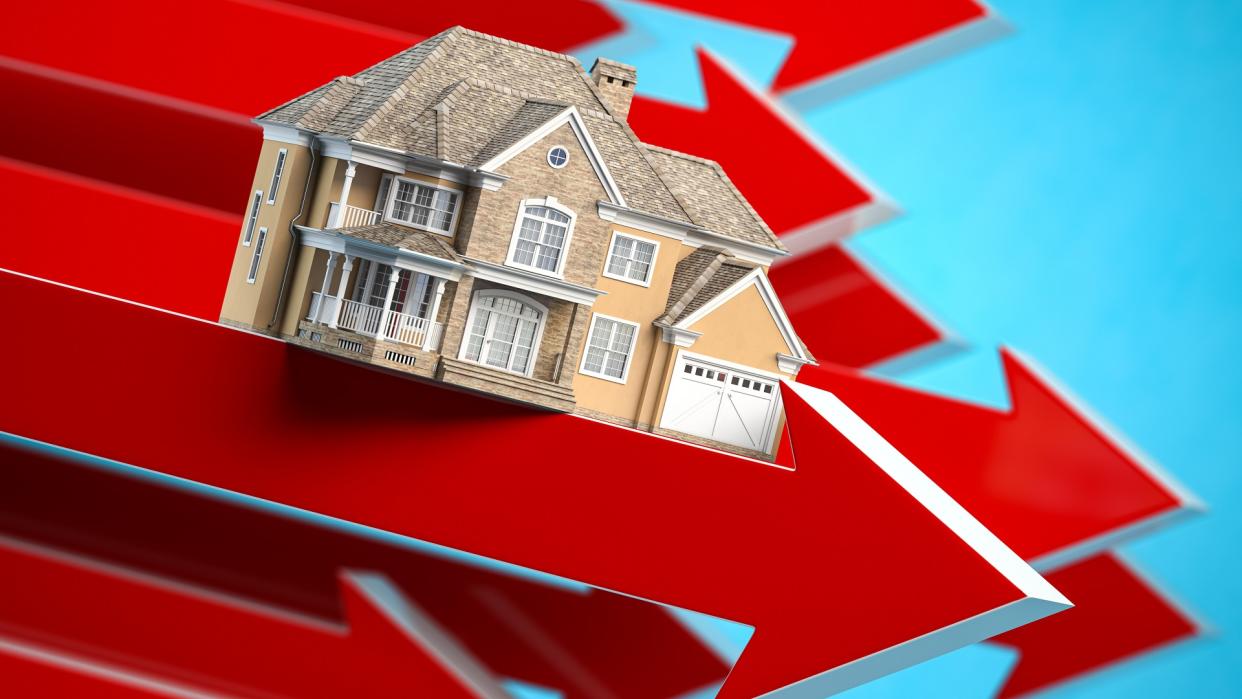A ‘Big Short’ Investor Predicts Repeat of 2007 Housing Market Crash

Almost two decades after the housing market crash, some experts are warning of a potential repeat of the economic disaster due to overlooked factors. “Big Short” investor Dave Burt, CEO of investment research firm DeltaTerra Capital, argues that climate risk might lead to mispricing issues in the real estate market.
See: The 10 Most Overpriced Housing Markets in the U.S. — 5 Are in Florida
Find: 10 US Cities With Plenty of Jobs and Cheap Housing
According to DeltaTerra research, asset values could start declining in 2023 for the 20% of homes exposed to structural changes related to climate risk. Were this to happen, Burt told CNBC that consequences could be similar to the correction seen during the global financial crisis.
“We think of this repricing issue as maybe a quarter of the size and magnitude of the [global financial crisis] in aggregate, but of course very, very damaging within those exposed communities,” Burt told CNBC.
His comments are in line with the analysis published in the journal Nature Climate Change, which noted climate change impacts threaten the stability of the U.S. housing market due to growing concerns that increasing costs of flooding are not fully captured in property values. The analysis found that residential properties exposed to flood risk are overvalued by $121-$237 billion.
Other experts echo the sentiment, including Bruce Kahn, senior portfolio manager, Shelton Capital Management, Sustainable Equity Fund, who also said that physical damages, massive costs and lives lost from climatic disruption are already underway in the U.S. economy.
“Investors are using advanced modeling techniques to pinpoint the degree of physical risk exposure of company facilities and using cost functions to estimate how those damages will impact the company,” said Kahn. ” And not only should individual investors be aware of these direct impacts, they should also be aware of how large institutional investors, such as Insurance companies and pension funds, are shifting their risk models based on climate risk, which in turn will affect stock prices.”
Take Our Poll: What Do You Plan To Use Your Tax Refund For?
DeltaTerra’s Burt has been warning about climate risk impacts for many months. In March, he testified to the Senate Budget Committee on systemic risks of wildfire and climate change, noting that the changes in monetary policy, mortgage rates, consumer housing and work preferences, and asset prices have further exacerbated “the insurance mispricing issues we research, setting the stage for a difficult asset bubble workout in the years to come,” according to a transcript of his remarks.
“As home insurance premiums reset to sustainable levels and local economies struggle under the weight of increasing infrastructure and disaster recovery costs, we believe fundamental cracks appearing in many at-risk markets will become chasms. Acute real estate market corrections strain the economy and American households as consumer balance sheets are eroded by home equity losses, housing-related jobs dry up, and foreclosures mount,” he said.
Yet, some experts don’t agree with that premise and counter-argue that the housing market is actually resilient — partly due to interest rates having peaked and deeming this issue solely an insurance one- not a broader housing market problem.
Jay Hatfield, CEO at Infrastructure Capital Advisors, said that there is no chance of a housing market crisis from climate risk, as there currently is a shortage of total homes for sale, with inventories of less than 1.8 million, compared to the 4.5 million homes for sale during the financial crisis.
Learn: Houses in These Cities Are Suddenly Bargains
Housing Market 2023: Is a Double-Digit Drop in Prices Coming?
“Consequently, we expect the housing market to remain resilient as mortgage rates have peaked and are likely to trend down as the 10-year treasury rallies,” said Hatfield. “We would characterize the climate risk to housing as an insurance issue, with most insurers unwilling to provide flood insurance. State and Federal insurance is available although many homeowners do not elect to obtain it. If there are uninsured losses that cause mortgage defaults, we do not believe that would be material to the housing sector as a whole.”
More From GOBankingRates
This article originally appeared on GOBankingRates.com: A ‘Big Short’ Investor Predicts Repeat of 2007 Housing Market Crash
